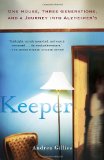Summary | Excerpt | Reading Guide | Reviews | Beyond the Book | Readalikes | Genres & Themes | Author Bio

Critics' Opinion:
Readers' Opinion:
First Published:
Aug 2010, 336 pages
Paperback:
Oct 2011, 336 pages
 Book Reviewed by:
Book Reviewed by:
Donna Chavez
Buy This Book
Alzheimer's disease is only one of many varieties of dementia, though by far the commonest. Over 60 percent of diagnosed dementia sufferers have Alzheimer's disease. Back in 2002, BBC News reported that more than 40 percent of UK home caregivers of someone with Alzheimer's had been forced to give up work in order to look after the person. In the United States, 10 million people act as caregivers to someone with dementia and millions more offer support. About the same percentage of American caregivers are not employed, and two thirds of those who can manage to hold down a job report major disruption to the workweek. I quote these statistics as a roundabout way of answering my own question: Why write this book at all? There were several reasons. One of these was to share in my own revelation, hard- earned, that Alzheimer's isn't just about memory loss; that memory loss isn't just about memory loss, but leads to disintegration. I wanted also to kick the system ineffectually in the shins; to give a glimpse into the dementia abyss; to show that for every "client" in the statistics there are one, two, four, six others (aka the family) whose lives are blighted in addition; in short, to give a little insight into the reality that ensues from the apparently noble idea (the noble, and for the country's financial bottom line, far preferable idea) that the elderly ill should stay at home whenever possible.
Question: Do governments understand just how dehumanizing Alzheimer's is? (A rhetorical question. Answer: no, or they wouldn't withhold good drug treatments or limit research programs on grounds of cost.) Question: Does anybody who hasn't been through it understand just how dehumanizing caregiving can be? (A rhetorical question. Answer: no, or there would be proper nursing home provision and it would be free.) As things stand in the United Kingdom, dementia patients in nursing homes, unlike cancer patients in hospitals, are regarded as "social care clients" and charged hotel rates, and if they have savings and houses must give them up to pay the bills. We British may regard ourselves as two steps ahead of the United States in the matter of universal rights to health care, but when it comes to dementia, the two systems are very alike. Medicaid will step in and pay for residence in a nursing home only if the ill person's own assets have dwindled away almost to nothing, and it's pretty much an identical situation in the United Kingdom. Once the money runs out, the ill person's house is likely to be sold to pay for care, unless a spouse or dependent is still living in it. Even if American houses can be placed out of risk in the short term, certainly they are at risk after the owner with dementia has died, via estate recovery (the rebate of nursing home fees in arrears to Medicaid - a policy that's pursued energetically in most states). Advice about loopholes in the system that allow a family to hang on to a loved one's home long term has grown into an industry, and almost every American Web site that talks about costs and rights to do with dementia suggests consulting an attorney. It's a system that's good for lawyers: in other words, bad law.
There's also a selfish answer to the why- write- the- book question. I'm one of those who have found work incompatible with caregiving, even work that I have always done at home, sitting at a table by a window, or slouched uncomfortably on a sofa, laptop at a precarious angle, mediating children's interruptions - work that you might assume would be ideal in the circumstances. It's more than economics in my case. Writing is more in the way of a compulsion. It may even be a psychiatric disorder. If days pass dryly - that is, without sentences being made and remade - I find that I begin to drift into the arena of the unwell. Throughout my years of caring for Nancy, the drive was there to produce something salable, but other than the occasional article, the content wouldn't follow the impulse. Following an early career producing sensible nonfiction and then a long hiatus while having and raising children, I was supposed to be cutting loose and writing a novel - and, on the face of it, I was immensely productive, almost manically so. I wrote two and a half novels. I wrote them in a rush, thinking, I can make some money at this (almost a guarantee of failure). The two finished ones were bad, superficial, studded with frustrations like cloves in an orange. The half is still a half, stopped, stalled. The muse left me. She did it quite abruptly, though things had been sticky between us for a while. After that, all I could seem to write about with any passion or conviction was my mother- in- law. Writing about her was sustaining through the dark days of creative roadblock. It was, to be blunt, a way of not cracking up.
Copyright © 2010 by Andrea Gillies
From the book Keeper by Andrea Gillies, published by Broadway Books, a division of Random House, Inc. Reprinted with permission.





The Funeral Cryer by Wenyan Lu
Debut novelist Wenyan Lu brings us this witty yet profound story about one woman's midlife reawakening in contemporary rural China.
Your guide toexceptional books
BookBrowse seeks out and recommends the best in contemporary fiction and nonfiction—books that not only engage and entertain but also deepen our understanding of ourselves and the world around us.